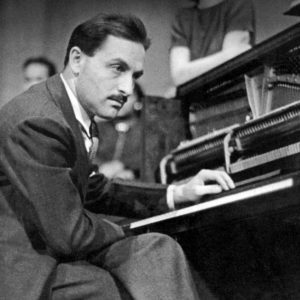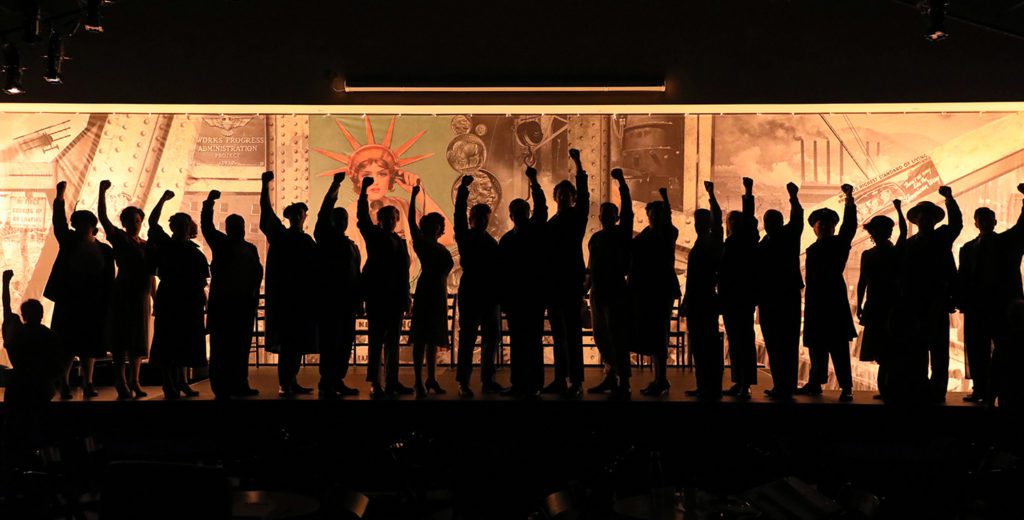Nashville Opera’s The Cradle Will Rock: an Anthem for All of Us
Marc Blitzstein’s The Cradle Will Rock is an ode to the working class, consisting of bountiful hot-button social commentary and dashes of sly barbs to boot. The work takes place in “Steeltown, USA,” and follows union organizer Larry Foreman’s efforts to unite the workers of the town and to fight back against the all-powerful Mr. Mister, who is in control of every part of town life. No, this isn’t a politically incorrect off-Broadway production that premiered last year, but a 1930’s play in music that was famously shut down before it could even take the stage. And, strikingly, Nashville Opera’s production utilizes a combination of authentic acting, minimalistic set design, and stellar producing in a way that (combined with contemporary events) makes Blitzstein’s work just as relevant now as it was when he wrote it.

Cradle originally came about from the Federal Theater Project under the post-great depression Works Progress Administration – a seemingly forgotten time when the government deemed it important to fund many art programs during an economic downturn. Because of this context, it is important to note the situation in which the work “premiered,” as Nashville’s rendition pays courtesy to this touchy beginning.
The night that Cradle was to be performed, the theater abruptly shut down due to “budget constraints” – or perhaps due to the opera’s pro-union message. Moving to another theater twenty blocks north of downtown Manhattan, the performers had to sing from the audience to obey theater policies and Blitzstein had to scrap his orchestra ensemble and hastily play instead on a dingy upright piano. As such, it is notable that John Hoomes, Nashville Opera’s artistic director, chose to keep this sparse instrumentation and characteristically spare set design. Amy Tate Williams nails it on the jazzy piano accompaniment that blends effortlessly with the performers, and kudos to the surprisingly large, Nashville-based cast for their gripping acting which more-or-less pays homage to the actors and actresses that made the premiere possible.
While it takes the minimum to get this work right, it can be quite easy to get it wrong. Fortunately, the raw emotion from Nashville’s cast is one that draws the audience in and makes Cradle a success – switching from the court trial in night jail, to each character’s interesting backstory, the over-arching narrative is captivating despite its simplistic nature and less than stellar musical numbers. What makes it bearable, and sometimes beautiful, is the score, where spoof passages that taunt

the bad guys alternate with pointed, yearning arias that distinguish the others. (If it sounds like Leonard Bernstein, that’s because Bernstein was a Blitzstein protégé.) In both modes, the music is more expressive than the lyrics, which seem to have been written for a pamphlet.
Most of the story progresses as a merry-go-round of bribery and corruption. Before the audience can be awed by the riveting soliloquy of the union organizer Larry Foreman (Eric Pasto-Crosby), we have the anti-union Liberty Committee to indulge us. Led by Galen Fott as Mr. Mister, the cronies, all of whom bring a different air to their roles, are presented in vignettes of sorts while being blackmailed into agreement. All the while there is the bona fide Reverend Salvation (Brett Hetherington) who tailors his sermons to match the political imperatives of the time, while Editor Daily (Patrick Thomas), who’s “made to order” news (most of it fake), alters the rest of Steeltown’s thoughts over the course of the work.
There’s also the progression of the lap dog artists, Dauber (Darius Thomas) and Yasha (Scott Rice). Truly one of the most comical scenes, they cozy up to the coy Mrs. Mister (Martha Wilkinson). Through her vivid charm and flirtatious acting, she is able to lure the two once again into this promise of a financial safety net – as long as they join her and her husband in opposing the union. While the scene is innocent from the outset and perfectly executed by the actors, it is unnerving nonetheless as a situation that is still so prevalent in the arts today.
The performance’s best moments, though, is its honesty and moments which contain a hint of a kind of winking, motley spirit, as when Luke Harnish — who’s fun to watch throughout — executes a silly ballet as a macho football coach. Megan Murphy Chambers has a strong voice and a sharp, light appeal as Moll, though she must spend most of the play sitting and listening. Brooke Leigh Davis sounds full and resonant as Ella Hammer, who brings the show to what should be its emotional climax with “Joe Worker,” a memorandum of suffering anger in the face of oppression by the bosses.
While the work is more about meaning than musical richness, the story ends with a finale that brings all that came before it into one big anthem, exclaiming
“there’s a storm that’s going to last until
The final wind blows, and when the wind blows
The cradle” [that would be the cozy, lofty enclave of the one percent] “will rock!”
This is the first time the audience witnesses the full chorus, and the cast appropriately fills the hall of Noah Liff Opera Center with a heartening send-off.
Both an attack on wealth and the corruption it can bring, as well as a paean to labor and poor people struggling to get by, the political message of Cradle is just as relevant now as it was then, and its continued revival speaks to its potential to reflect on contemporary society. Nashville Opera brought all of this into focus by staying true to their motto: “Sing Bravely.” And while the conflicts between freedom and security, corruption and innocence, and power and integrity may have changed their manifestations since the 1930s, they still exist today and the continuing impact of The Cradle Will Rock can be found in its ability to speak plainly to these issues through music.



